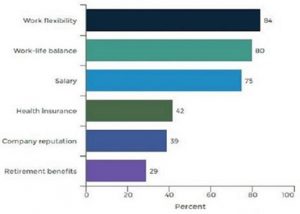
Flextime Benefits and Salary
Parents Rank Flextime Benefits Ahead of Salary
Nearly 40 percent of parents have left a job because it lacked work flexibility
By Stephen Miller, CEBS
Work flexibility and work/life balance are the most important factors for parents of young children when considering a job opportunity. Parents placed flextime benefits ahead of salary, health insurance, company reputation and 401(k)/retirement benefits when evaluating a job prospect, according to a recent survey of nearly 1,200 parents with school-age children.

Working parents’ interest in work flexibility has increased dramatically in the past several decades, revealed the survey sponsored by FlexJobs, a Boulder, Colo.-based website for telecommuting, flexible schedule, part-time and freelance job listings.
More than Convenience
“Work flexibility is not just a convenience for working parents but a real necessity,” said Sara Sutton Fell, founder and CEO of FlexJobs. “Nearly 40 percent have actually left a job because of the lack of work flexibility options, and an additional 20 percent are actively looking” for new jobs that offer these options. “From recruiting and retention perspectives, it is costly to any company for more than half of their working parent employees to leave or consider leaving, especially when 86 percent of working parents would be more loyal to an employer if they simply had flexible work options.”
The top reasons given by parents for seeking flexible work included:
- More time with family (83 percent of respondents).
- More free time, generally (45 percent).
- Limiting commuting stress (43 percent).
The survey uncovered other benefits of work flexibility, including:
- 98 percent of working parents think having a job with flexible work arrangements would have a positive impact on their overall quality of
- 93 percent said it would increase their volunteerism at their children’s schools or with organized
- 88 percent said it would save them
- 87 percent think it would help them be less
- 78 percent believe it would make them
“Inflexible jobs make it next to impossible for working parents to be active and engaged with their children’s schools,” said Brie Weiler Reynolds, a senior career specialist at FlexJobs.
Parents are “also keenly aware of how work flexibility can impact their quality of life when it comes to health and stress.”
The most in-demand type of flexible arrangement for working parents is 100 percent telecommuting (89 percent), but flexible schedule (74 percent), part-time schedule (51 percent) partial telecommuting (49 percent), alternative schedule (49 percent) and freelance (42 percent) options are also in demand.
According to the Society for Human Resource Management’s (SHRM’s) 2016 Employee Benefits research report, telecommuting benefits have seen a threefold increase during the past two decades, from 20 percent of organizations offering the benefit in 1996 to 60 percent in 2016.
For tips on managing teleworkers, see the SHRM Online article – Experts: Threefold Increase in Telecommuting Is Sign of the Times.
Reprint courtesy of the Society for Human Resources Management